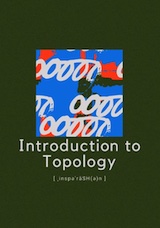
|
FreeComputerBooks.com
Links to Free Computer, Mathematics, Technical Books all over the World
|
|
- Title: Introduction to Topology
- Author(s) Renzo Cavalieri, et al.
- Publisher: Colorado State University
- Hardcover/Paperback: N/A
- eBook: PDF
- Language: English
- ISBN-10: N/A
- ISBN-13: N/A
- Share This:

|
This introductory topology book requires only a knowledge of calculus and a general familiarity with set theory and logic. Equally approachable and rigorous, the book’s clear organization, worked examples, and concise writing style support a thorough understanding of basic topological principles.
About the Authors- N/A
- Topology
- Geometry
- Calculus and Mathematical Analysis (Real Analysis, Functional Analysis, etc.)
- Algebra, Abstract Algebra, and Linear Algebra, etc.

- Introduction to Topology (Renzo Cavalieri)
- The Mirror Site (1) - PDF
- The Mirror Site (2) - PDF
- The Mirror Site (3) - PDF
-
 Introduction to Topology (Bert Mendelson, et al.)
Introduction to Topology (Bert Mendelson, et al.)
This concise book offers an ideal introduction to the fundamentals of topology. The book's principal aim is to provide a simple, thorough survey of elementary topics in the study of collections of objects, or sets, that possess a mathematical structure.
-
 Elementary Topology: Problem Textbook (O.Ya.Viro, et al.)
Elementary Topology: Problem Textbook (O.Ya.Viro, et al.)
This textbook on elementary topology contains a detailed introduction to general topology and an introduction to algebraic topology via its most classical and elementary segment centered at the notions of fundamental group and covering space.
-
 Topology without Tears (Sidney A. Morris)
Topology without Tears (Sidney A. Morris)
General topology is the branch of topology dealing with the basic set-theoretic definitions and constructions used in topology. The aim of this is to provide a thorough grouding of general topology. It offers an ideal introduction to the fundamentals of topology.
-
 Real Variables with Basic Metric Space Topology (Robert B. Ash)
Real Variables with Basic Metric Space Topology (Robert B. Ash)
Designed for a first course in real variables, this text presents the fundamentals for more advanced mathematical work, particularly in the areas of complex variables, measure theory, differential equations, functional analysis, and probability.
-
 Topology Lecture Notes (Ali Sait Demir)
Topology Lecture Notes (Ali Sait Demir)
This lecture notes lead readers through a number of nontrivial applications of metric space topology to analysis, clearly establishing the relevance of topology to analysis. Covers metric space, point-set topology, and algebraic topology, etc.
-
 General Topology (Pete L. Clark)
General Topology (Pete L. Clark)
This is an oustanding book on introductory topology (point set topology). The book is short. However, it is solid and complete and the proofs presented by the author are surprisingly optimised: very concise but always clear.
-
 Topology: A Categorical Approach (Tai-Danae Bradley, et al)
Topology: A Categorical Approach (Tai-Danae Bradley, et al)
A graduate-level textbook that presents basic topology from the perspective of category theory. Many graduate students are familiar with the ideas of point-set topology and they are ready to learn something new about them.
-
 Topological Groups: Yesterday, Today, Tomorrow (Sidney A. Morris)
Topological Groups: Yesterday, Today, Tomorrow (Sidney A. Morris)
In 1900, David Hilbert asked whether each locally euclidean topological group admits a Lie group structure. This was the fifth of his famous 23 questions which foreshadowed much of the mathematical creativity of the twentieth century.
-
 Topology of Numbers (Allen Hatcher)
Topology of Numbers (Allen Hatcher)
A textbook on elementary number theory from a geometric point of view, as opposed to the usual strictly algebraic approach. A fair amount of the book is devoted to studying Conway's topographs associated to quadratic forms in two variables.
-
 Geometry with an Introduction to Cosmic Topology
Geometry with an Introduction to Cosmic Topology
The text uses Mobius transformations in the extended complex plane to define and investigate these three candidate geometries, thereby providing a natural setting in which to express results common to them all, as well as results that encapsulate key differences.
-
 Algebraic Topology (Allen Hatcher)
Algebraic Topology (Allen Hatcher)
This introductory text is suitable for use in a course on the subject or for self-study, featuring broad coverage and a readable exposition, with many examples and exercises. The four main chapters present the basics: fundamental group and covering spaces, homology and cohomology, higher homotopy groups, and homotopy theory generally.





